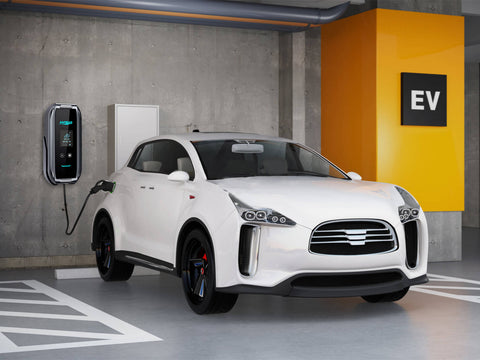
Electric vehicles (EVs) are cruising onto roads in record numbers, and with them comes the need for a smarter charging experience at home. Imagine a home charger that seamlessly integrates with your smart home system, tracks energy use, and even keeps an eye on your car with a security camera. Intrigued? We are too!
But what features would truly elevate a home EV charger from functional to fantastic? Let's explore the minds of EV owners to see what makes their ideal next-level charger tick. Will it prioritize seamless smart home integration, or maybe boast features like built-in user tracking and security cameras? We'll explore these questions and brainstorm some innovative ideas to craft the ultimate vision of a home EV charger that goes beyond the ordinary. Buckle up and get ready to energize your EV ownership experience!
What Are the Desirable Smarter Features of Next-Level EV Charger?

Electric vehicles (EVs) are rapidly becoming a mainstream choice, and with that surge comes the desire for a more convenient and intelligent home charging experience. Forget the basic plug-and-play chargers – the next-level EV charger is here to transform how you power your electric journey. But what features would truly set it apart? Let's tap into the minds of EV owners and explore their dream features as per the survey and summarize information from website forums such as Quora and Reddit..
Smart Home Integration: Seamless Connectivity for a Connected Lifestyle
Imagine a world where your EV charger seamlessly integrates with your existing smart home system. This, according to many EV owners, is a key feature for the next generation of home chargers. Open APIs would allow the charger to communicate with systems like OpenEVSE, creating a truly connected charging experience. This integration could unlock possibilities like automated charging schedules based on your electricity rates or pre-conditioning your car's battery in extreme temperatures for optimal charging efficiency.
Multi-User Tracking: Sharing the Charge Without the Hassle
Do you live in a multi-unit dwelling or own a small business with an EV charging station? RFID functionality could be a game-changer. With RFID tags assigned to each vehicle or user, the charger could track individual energy usage. This would eliminate the need for guesswork when splitting the electric bill or keeping track of charging costs in a shared environment.
Prioritizing Core Functionality: Keeping it Simple and Effective
While advanced features may be attractive, many EV owners prioritize core functionality. Basic features such as well-placed charging lights for nighttime use hold more value than unnecessary additions like security cameras. The essence lies in refining the fundamental charging experience before integrating extravagant extras. It's essential to prioritize features that directly enhance the charging process, ensuring convenience and efficiency without unnecessary complexities. Therefore, the primary takeaway is to focus on perfecting the core charging experience before considering additional bells and whistles.
Future-Proofing with Open Protocols: Avoiding Vendor Lock-in
Anticipating future compatibility is vital. Consider a situation where a cloud-based security camera service becomes obsolete. By integrating open protocols like RTSP or ONVIF, the charger can maintain compatibility with a range of security camera systems. This approach safeguards against vendor lock-in, ensuring your security features remain operational regardless of changes in technology or service providers. By adopting open standards, the charger fosters flexibility and longevity, allowing you to adapt to evolving security needs without the risk of being tied to a single proprietary system.
Simplicity Matters: Keeping Track of Consumption with Ease
Not every EV owner needs a "smart" charger. Some prefer a simpler approach with built-in features that enhance usability. For these users, a "dumb" charger with a built-in consumption meter might be ideal. Offering features like lifetime and trip counters allows users to easily monitor their energy usage without needing complex smart home integration.
Convenient Cable Management: A Tangle-Free Charging Experience
Ever wrestle with a tangled mess of charging cables? A user-friendly solution would be an integrated cable retractor. Similar to the auto-belays used by climbers, this feature would automatically retract the cable when not in use, keeping your charging station neat and organized.
Features Beyond the Basics for Enhanced Security and Convenience
The next-level EV charger doesn't stop at smart functionality. Let's explore some additional features that can elevate your charging experience:
Security Cameras
In addition to smart functionality, advanced EV charger, including the home Level 2 EV charger may come equipped with motion-activated Wi-Fi connected security cameras. These cameras provide an extra layer of security for parked vehicles, particularly for portable chargers used outdoors. With remote monitoring capabilities, users can keep an eye on their vehicles and deter potential theft even when they're away from home.
Voice Control Integration
Another futuristic feature of next-level EV chargers is voice control integration. Imagine being able to start or stop your EV charge with a simple voice command. By seamlessly integrating with popular smart home systems like Google Assistant or Amazon Alexa, these chargers offer hands-free control, adding an extra layer of convenience to your charging routine.
Smart Scheduling
Electricity rates can vary significantly throughout the day, but a smart Level 2 charger takes this into account. By automatically scheduling charging sessions during off-peak hours when electricity rates are lower, these chargers help users save money on their electricity bills. This intelligent feature not only optimizes charging efficiency but also maximizes cost savings over time.
Weather-Responsive Charging
Extreme temperatures can affect battery performance and overall driving range. To address this issue, future EV chargers may integrate with weather forecasting services. By monitoring upcoming weather conditions, the charger can pre-condition the car's battery accordingly, optimizing charging efficiency and ensuring optimal battery performance regardless of the weather outside. This innovative feature enhances the reliability and functionality of the EV charging experience, providing users with peace of mind in any climate.
Potential Future Advancements of Home EV Charging
The future of home EV charger is brimming with exciting possibilities. Here's a glimpse at some potential advancements that could revolutionize the way we power our electric vehicles:
Bi-directional Charging
In the realm of future advancements, bi-directional charging stands out as a promising prospect. This technology would enable electric vehicles not only to draw power from the grid but also to serve as energy storage units capable of powering homes during peak demand or even selling excess solar energy back to the grid. This bidirectional flow of electricity could revolutionize the way we utilize renewable energy sources and manage power distribution.
Aesthetics and Design
Another area ripe for innovation in home EV charging is aesthetics and design. As electric vehicles become increasingly integrated into our daily lives, there is a growing emphasis on creating charging solutions that seamlessly blend with home environments. Future Level 2 EV chargers, including the Tesla destination charger, may feature sleek and modern designs, with customizable options to match various architectural styles and preferences. These aesthetically pleasing chargers would not only enhance the visual appeal of residential spaces but also contribute to the overall user experience by seamlessly integrating into the home environment.
While these advancements are still on the horizon, they represent the exciting potential of home EV charging technology. Bi-directional charging could empower consumers to actively participate in the energy ecosystem, while innovative designs could transform EV chargers into stylish and functional additions to residential settings. As the electric vehicle industry continues to evolve, we can look forward to the realization of these futuristic concepts, bringing greater convenience, sustainability, and aesthetic appeal to home EV charging solutions.
FAQs / People Also Ask
This article explored the features that could define the next generation of home EV chargers. But you might still have some questions. Let's delve into some frequently asked questions:
Q: Do I need a smart home system for a next-level EV charger?
A: Not necessarily! While smart home integration offers numerous possibilities, some users prefer simpler "dumb" chargers with built-in features like consumption meters. The ideal choice depends on your individual needs and preferences.
Q: Are there any security concerns with smart EV chargers?
A: As with any internet-connected device, security is a consideration. However, features like open protocols (RTSP/ONVIF) for security cameras can help avoid vendor lock-in and ensure continued functionality even if cloud services change.
Q: What are the benefits of bi-directional charging?
A: Bi-directional charging offers exciting possibilities. It could allow your EV to act as a backup power source during outages or even sell excess solar energy back to the grid, promoting energy independence and grid stability.
Q: When can I expect to see these next-level chargers on the market?
A: Some features, like smart home integration and RFID tracking, are already available in certain models.However, more futuristic features like bi-directional charging are still under development. The timeline for widespread adoption will depend on technological advancements and market forces.
Q: How much will a next-level EV charger cost?
A: The cost will vary depending on the specific features included. Generally, expect to pay more for chargers with advanced features like smart home integration or security cameras. However, as technology evolves, prices are likely to become more competitive.




